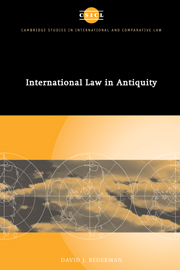Book contents
- Frontmatter
- Contents
- Acknowledgments
- List of abbreviations
- Maps
- 1 A methodological introduction: this study and its limitations
- 2 State relations in ancient civilizations
- 3 Religion and the sources of a law of nations in antiquity
- 4 Making friends: diplomats and foreign visitors in ancient times
- 5 Making faith: treaty practices amongst ancient peoples
- 6 Making war: the commencement and conduct of hostilities in ancient times
- 7 Civilization and community in the ancient mind
- Topical bibliography
- Index
- CAMBRIDGE STUDIES IN INTERNATIONAL AND COMPARATIVE LAW
3 - Religion and the sources of a law of nations in antiquity
Published online by Cambridge University Press: 23 October 2009
- Frontmatter
- Contents
- Acknowledgments
- List of abbreviations
- Maps
- 1 A methodological introduction: this study and its limitations
- 2 State relations in ancient civilizations
- 3 Religion and the sources of a law of nations in antiquity
- 4 Making friends: diplomats and foreign visitors in ancient times
- 5 Making faith: treaty practices amongst ancient peoples
- 6 Making war: the commencement and conduct of hostilities in ancient times
- 7 Civilization and community in the ancient mind
- Topical bibliography
- Index
- CAMBRIDGE STUDIES IN INTERNATIONAL AND COMPARATIVE LAW
Summary
International law has been called a primitive legal system. A review of the literature developing that assertion is made elsewhere in this study, and it does provide the initial premise for this chapter. International lawyers will go to any lengths to defend their discipline against the charge that it is anything less than “real” law. Yet they will readily concede that State relations in the ancient world were unprincipled, devoid of any sense of legal obligation, and without effective sanctions. In short, they acknowledge for antiquity what they deny for the modern law of nations. This chapter critically reviews this concession by examining the sources of a law of nations, and of international legal obligation, in ancient times.
A number of characterizations have been attributed to primitive legal systems. Some of these describe the contents of primitive legal doctrines, most notably the lack of certainty and security of expectation, the limited range of norms, and the use of retaliation (rather than social sanction) as the decisive element of enforcement. Other characterizations describe what might be called the “process” elements of primitive law. Legal fictions, which transformed doctrines by subtly changing their underlying assumptions as social demands required, competed with formalism which exalted form (the integrity of ritual) over substance (the adaptability of rules).
Moreover, the very sources of legal obligation can be called “primitive.” Two phenomena have been observed in this respect. First, there is the importance of custom in determining the content of norms.
- Type
- Chapter
- Information
- International Law in Antiquity , pp. 48 - 87Publisher: Cambridge University PressPrint publication year: 2001



